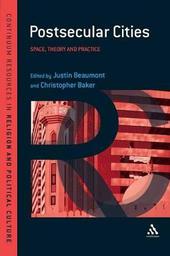
|
Postsecular Cities: Space, Theory and Practice
Paperback / softback
Main Details
Description
This book reflects the wide-spread belief that the twenty-first century is evolving in a significantly different way to the twentieth, which witnessed the advance of human rationality and technological progress, including urbanisation, and called into question the public and cultural significance of religion. In this century, by contrast, religion, faith communities and spiritual values have returned to the centre of public life, especially public policy, governance, and social identity. Rapidly diversifying urban locations are the best places to witness the emergence of new spaces in which religions and spiritual traditions are creating both new alliances but also bifurcations with secular sectors. Postsecular Cities examines how the built environment reflects these trends. Recognizing that the 'turn to the postsecular' is a contested and multifaceted trend, the authors offer a vigorous, open but structured dialogue between theory and practice, but even more excitingly, between the disciplines of human geography and theology. Both disciplines reflect on this powerful but enigmatic force shaping our urban humanity. This unique volume offers the first insight into these interdisciplinary and challenging debates.
Author Biography
Justin Beaumont is Lecturer at the Faculty of Spatial Sciences, University of Groningen in The Netherlands and one of the lead partners in the EU-7FP FACIT project. Christopher Baker is Director of Research for the William Temple Foundation and Senior Lecturer in Public and Urban Theology at the University of Chester, UK.
Reviews'Led by two influential scholars, this volume brings together a rich diversity of contributions from theology and social science disciplines to elaborate on the postsecular city, including its expressions and limitations. The volume promises to stimulate further dialogue about the simultaneous rapprochement and bifurcation between the sacred and the secular in the city. Consequently, both advocates and critics of the "postsecular city" will be challenged to think more deeply about the place of religion, faith and spirituality in the contemporary city.' Professor Lily Kong, National University of Singapore -- Professor Lily Kong Reviewed in Archives de Sciences Sociales des Religions.
|